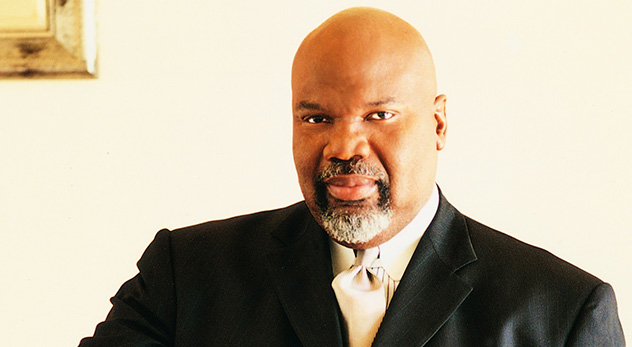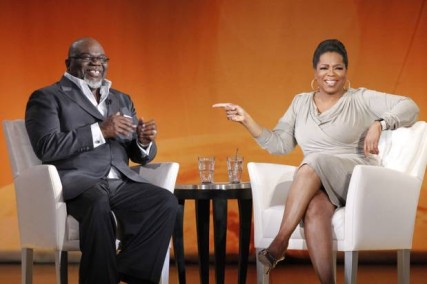Bishop T.D. Jakes is one of America’s most prominent religious leaders and pastor of The Potter’s House, a 30,000-member congregation located in Dallas, Texas. But Jakes is far more than a preacher.
“I cannot be pigeon-holed,” he told me in our interview this week.
Since 2008, he’s been working as a producer and writer of feature films through a partnership with Sony Pictures. His movies include the box office hit “Jumping the Broom” and the remake of “Sparkle” starring Jordin Sparks and the late Whitney Houston. He’s the bestselling author of numerous books including, most recently, Let It Go: So You Can Be Forgiven. In October, Jakes’ new talk show, “Mind, Body, and Soul”, debuts on BET.
Though his projects are varied, the theme of family connects many of them. Jakes intends to uplift families with his books and films, and he speaks to family issues through his sermons. In two weeks, more than 40,000 will attend his MegaFest conference in Dallas where he hopes to bring a special word to America’s many flailing families. Here, we talk about what he believes is causing the breakdown of American families and what he plans to do about it.
JM: A lot of Christians talk about how the “breakdown of the American family.” As a pastor, you deal with family problems all the time. Do you think the American family is in serious trouble?
TJ: Absolutely. There’s no question about that, and the stats bear it out. It has hit the minority community hardest and first, but first means it won’t be last. It’s spreading to the general populace as well.
JM: You’ve got your MegaFest conference coming up in Dallas. I know you hope to draw families, not just individual attendees. How do you hope to use your platform through that conference to build up and encourage American families?
TJ: I’m so excited about it. First of all, people of all colors are buying tickets and that puts black families and white families in the room where we can attack the problem together. It is our shared problem. Our problem is your problem, and your problem is our problem. We are on the same boat.
One of the things I hope to do is to point out the fact that fatherhood is seldom modeled to men. And it is hard to be what you cannot see. You and I can walk down to any department store and find a figurine of a mother holding a baby, but we’d have to work hard to find a picture of a man holding one. We’re not modeling fatherhood in art or film or in our own homes.
The fact that we are male enough to produce a child does not make us man enough to raise a child, especially when we are asking men to play a role for which they have no script. My solution is to show men that it is not as much about showing the bad job some have done but lifting up men who do a good job, so we can see what we’re trying to be. Until fatherhood is modeled, our men will continue to shrink away from it and the stats will continue to worsen.
The real power of MegaFest is in the car ride to the event. It’s in the hotel after the event is over. It’s dads taking their kids out to get something to eat and spending quality time without work getting in the way. Because family is in little things. Having raised five children, the things they remember are not the things I paid the most for; they were the little silly things. They were the times I cut up their steak or pancakes in a restaurant. So I’m calling families to a big event so they can have little things together.
JM: You’re going to be talking with Oprah at MegaFest about problems facing African-American families, something that has become a growing debate in the wake of the Zimmerman trial. What are the biggest problems the African-American community is facing, and what is the solution?
TJ: Before I answer that, I’m aghast at the question. Because Trayvon Martin’s family handled themselves incredibly well throughout a horrific experience. I’ve never seen a mother and a father unite around their child like they did. I don’t see the bridge between the Trayvon Martin situation and the crisis in the African-American family. There is certainly a crisis in the African-American family, but Trayvon Martin’s family is not a good depiction of that crisis. I can take you to many places and show you people whose mothers wouldn’t be sober enough to do a press conference and whose fathers can’t be found. When I look for the poster-child for the family crisis in the African-American community, I would never point to Trayvon Martin.
If I could separate one from the other, in response to the problem we’re having in our community, fatherlessness is a major part of that. When single parents raise children alone, especially in lower income families, the children are left at home for long periods of time. If children are left to raise themselves in inner-city areas, then gangs become families and gang leaders become daddies and drug dealers become mommas and the person who could’ve been the second black president of the United States becomes a major drug dealer.
The upside of this is when you see people like President Obama who was a product of a single white mother. This lets us know that the problem is not just segregated to one community and that it is possible for a single mother to successfully raise a child. I think that the color of the president’s skin obscured America from having a conversation about him having a single mother. I don’t think we have many presidents who came from a single parent home.
So while there is disparity on one hand, there is hope on the other.
JM: Speaking of the Martin family, you made headlines recently with a comment you made about the trial in a sermon. In your opinion, was justice upheld in the Trayvon Martin case?
TJ: I think that the problem here is that America must realize that the law can be adhered to and justice still not be accomplished. There is often a gulf between the two. And that is particularly resounding amongst African-Americans where just a few years back, we were being beaten, and it was legal. Where we couldn’t vote, and it was legal. So the real question is whether there is an equality between the law and justice.
This is bigger than black and white. It is a clarion call to dispel the increasing disparity between what is legal and what is just.
JM: You’ve become so active in filmmaking as a tool to lift up families. How do you think the medium of film specifically can strengthen American families?
TJ: I’ve watched people down through history change the world through television. I have watched black comedians walk across stages, crossing cultures and breaking barriers. I have watched American Bandstand introduce talent that America marveled at. And I have concluded that the screen in all of its sizes, shapes, and forms is the greatest platform in the world.
As we are blessed with opportunities to make films, we have a responsibility to project the kind of images that gives America more options. We don’t want to censor or control. We just want to be included on the menu of options of possibilities. And I think that if I can put an image on the screen that makes people laugh or love or think or cry, I’ll have done something.
If audiences can see a marriage that almost fell apart like “Not Easily Broken” and see it be resurrected out of the ashes, maybe they won’t run to divorce court so quickly. If they can see a child who was headed for a gang like in “Black Nativity” and see the process aborted by someone who intervened, then maybe they will stop that little boy on the corner who is about to sell drugs or vandalize an automobile. Maybe they’ll help him realize that he is not a criminal; he’s just an angry child who can’t find his daddy.
That is lofty and probably an unreasonable expectation, but it is from those expectations that champions arise. It is from those types of expectations that you think you could take a rock and kill a giant. Every film is just a rock and the world is giant, but I’m determined to throw it.







